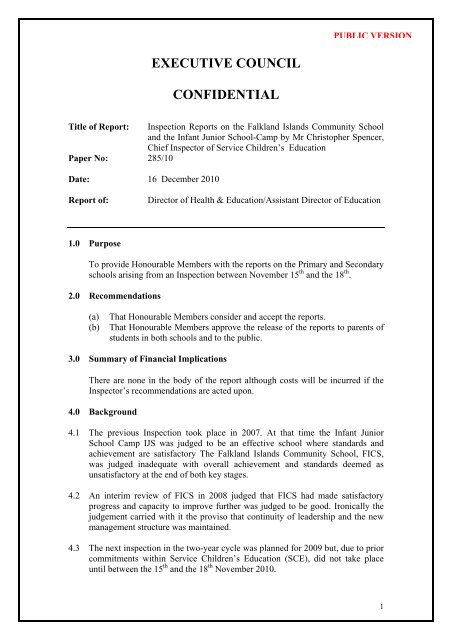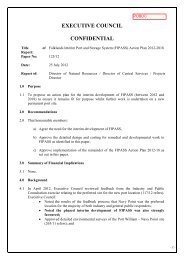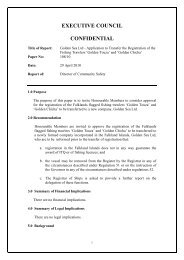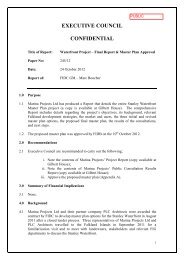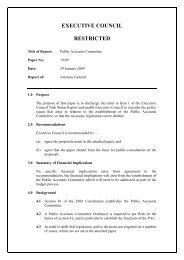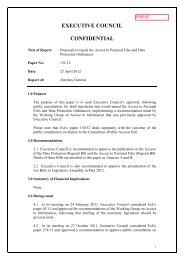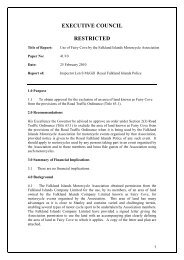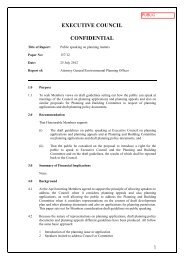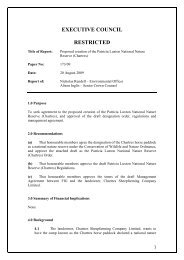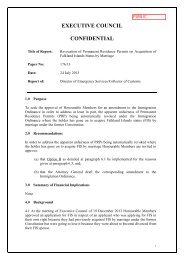Inspection Reports on the Falkland Islands Community School and ...
Inspection Reports on the Falkland Islands Community School and ...
Inspection Reports on the Falkland Islands Community School and ...
Create successful ePaper yourself
Turn your PDF publications into a flip-book with our unique Google optimized e-Paper software.
Stanley Infant Junior <strong>School</strong> <strong>and</strong>Camp Educati<strong>on</strong><str<strong>on</strong>g>Inspecti<strong>on</strong></str<strong>on</strong>g> ReportVisited 15 <strong>and</strong> 16 November 2010Christopher SpencerAssistant Director of Educati<strong>on</strong> <strong>and</strong> Chief InspectorService Children’s Educati<strong>on</strong>HQ SCEBFPO 40UK
Stanley Infant <strong>and</strong> Junior <strong>School</strong> <str<strong>on</strong>g>Inspecti<strong>on</strong></str<strong>on</strong>g> Report November 2010Introducti<strong>on</strong>The inspecti<strong>on</strong> was carried out by <strong>the</strong> Chief Inspector <strong>and</strong> <strong>on</strong>e primaryheadteacher from Service Children’s Educati<strong>on</strong> over two days. All classeswere visited so that a range of less<strong>on</strong>s <strong>and</strong> pupils’ work was observed.Discussi<strong>on</strong>s were held with <strong>the</strong> headteacher, senior teachers <strong>and</strong> core subjectcoordinators. Parents,’ pupils’ <strong>and</strong> staff views were sought throughquesti<strong>on</strong>naires.Key for inspecti<strong>on</strong> gradesGrade 1Outst<strong>and</strong>ingGrade 2GoodGrade 3SatisfactoryGrade 4InadequateThe evaluati<strong>on</strong> schedule used for <strong>the</strong> inspecti<strong>on</strong> was based <strong>on</strong> that used forOfsted inspecti<strong>on</strong>s in Engl<strong>and</strong> <strong>and</strong> within Service Children’s Educati<strong>on</strong> in2010. It should be noted that this current schedule has fewer grades <strong>and</strong>revised assessment criteria compared to those in use at <strong>the</strong> time of <strong>the</strong>previous inspecti<strong>on</strong> so that direct comparis<strong>on</strong>s cannot be made with anyjudgements in former reports.The following terminology is used in <strong>the</strong> report to describe <strong>the</strong> three keystages covered by <strong>the</strong> school:Foundati<strong>on</strong> Stage refers to pupils in Pre-<strong>School</strong> <strong>and</strong> Recepti<strong>on</strong>, whose 4th<strong>and</strong> 5 th birthdays fall during <strong>the</strong> current school year;Key Stage 1 refers to years 1 <strong>and</strong> 2 of <strong>the</strong> English Nati<strong>on</strong>al Curriculum; <strong>the</strong>seare pupils whose 6 th <strong>and</strong> 7 th birthdays fall during <strong>the</strong> current school year;Key Stage 2 refers to years 3 to 6 of <strong>the</strong> English Nati<strong>on</strong>al Curriculum, pupilswhose 8 th to 11 th birthdays fall during <strong>the</strong> current school year.The inspecti<strong>on</strong> was c<strong>on</strong>ducted by two inspectors over two days. All classeswere visited at least <strong>on</strong>ce, including joint observati<strong>on</strong>s with <strong>the</strong> actingheadteacher, <strong>and</strong> acting deputy headteacher. A range of pupils’ work wasreviewed. Discussi<strong>on</strong>s were held with senior leaders, <strong>and</strong> <strong>the</strong> co-ordinator forspecial educati<strong>on</strong>al needs. The views of parents, pupils <strong>and</strong> staff werega<strong>the</strong>red through a questi<strong>on</strong>naire. In additi<strong>on</strong>, pupils were interviewed toascertain <strong>the</strong>ir views of <strong>the</strong> school. The school completed a detailed selfevaluati<strong>on</strong>before <strong>the</strong> visit.2
Stanley Infant <strong>and</strong> Junior <strong>School</strong> <str<strong>on</strong>g>Inspecti<strong>on</strong></str<strong>on</strong>g> Report November 2010Informati<strong>on</strong> about <strong>the</strong> schoolStanley Infant <strong>and</strong> Junior <strong>School</strong> is a school of 255 pupils that serves <strong>the</strong>populati<strong>on</strong> of Stanley in <strong>the</strong> <strong>Falkl<strong>and</strong></strong> <strong>Isl<strong>and</strong>s</strong>. There are more girls than boysin <strong>the</strong> school. Very young children in Foundati<strong>on</strong> Stage 1 attend for a half daysessi<strong>on</strong> ei<strong>the</strong>r in <strong>the</strong> morning or <strong>the</strong> afterno<strong>on</strong>. Some 16 per cent of pupilshave special <strong>and</strong> additi<strong>on</strong>al educati<strong>on</strong> needs <strong>and</strong> 22 learners speak Englishas an additi<strong>on</strong>al language. Of <strong>the</strong>se, 10 are at an early stage of Englishlanguage acquisiti<strong>on</strong>. Many of <strong>the</strong>se EAL learners come from Chile. Classsizes are similar to that found in Engl<strong>and</strong>. In Year 2 <strong>and</strong> 6, <strong>the</strong>re are twoforms of entry. Setting by ability takes place in Years 2 <strong>and</strong> 6 for literacy <strong>and</strong>numeracy <strong>and</strong>, from Foundati<strong>on</strong> Stage 2 to Year 3, for ph<strong>on</strong>ics less<strong>on</strong>s.The school currently has both an acting head <strong>and</strong> an acting deputy head. Asubstantive replacement may not be in post until September 2011. Allteachers are trained in <strong>the</strong> United Kingdom <strong>and</strong> most have UK experience.Many of <strong>the</strong>se teachers are employed <strong>on</strong> fixed term c<strong>on</strong>tracts by <strong>the</strong> <strong>Falkl<strong>and</strong></strong><strong>Isl<strong>and</strong>s</strong> Government. The accommodati<strong>on</strong> is bright <strong>and</strong> attractive but is a mixof a variety of buildings both purpose built <strong>and</strong> n<strong>on</strong>-purpose built. The schoolis also resp<strong>on</strong>sible for <strong>the</strong> educati<strong>on</strong> of those pupils who reside in <strong>the</strong> outlyingcountryside <strong>and</strong> isl<strong>and</strong>s known as Camp Educati<strong>on</strong>. There are currently 22pupils being educated in <strong>the</strong>se remote parts. It has not been possible toevaluate fully <strong>the</strong> quality of provisi<strong>on</strong> in Camp Educati<strong>on</strong> during this inspecti<strong>on</strong>although <strong>on</strong>e outlying school at Goose Green was visited by inspectors <strong>and</strong>found to be offering good provisi<strong>on</strong>.Overall effectiveness of <strong>the</strong> school Grade: 3Stanley Infant <strong>and</strong> Junior <strong>School</strong> is a satisfactory <strong>and</strong> improving school thathas good capacity for sustained improvement under <strong>the</strong> current leadership.Recent initiatives have moved <strong>the</strong> school forward at a much higher rate ofprogress. The school has improved since its last inspecti<strong>on</strong> but key aspectsof <strong>the</strong> issues identified for improvement in 2007 have still to be completed.3
Stanley Infant <strong>and</strong> Junior <strong>School</strong> <str<strong>on</strong>g>Inspecti<strong>on</strong></str<strong>on</strong>g> Report November 2010What does <strong>the</strong> school need to do to improve fur<strong>the</strong>r?Raise st<strong>and</strong>ards in all subjects, especially ma<strong>the</strong>matics so that pupils attain atleast in line with English nati<strong>on</strong>al expectati<strong>on</strong>s or better <strong>and</strong> ensure that <strong>the</strong>yall make <strong>the</strong> expected gains in <strong>the</strong>ir progress by:• developing <strong>the</strong> use of target setting• developing <strong>the</strong> recently introduced pupil progress interviews so thatappropriate interventi<strong>on</strong> strategies are implemented <strong>and</strong>• implementing a c<strong>on</strong>tinuous professi<strong>on</strong>al development programmefor all staff that supports new members <strong>and</strong> facilitates <strong>the</strong> sharing ofgood practice.Improve <strong>the</strong> quality of teaching <strong>and</strong> learning so that more is good by:• streng<strong>the</strong>ning assessment for learning practices so that <strong>the</strong>y arec<strong>on</strong>sistently applied across <strong>the</strong> school <strong>and</strong>• developing <strong>and</strong> promoting fur<strong>the</strong>r <strong>the</strong> agreed m<strong>on</strong>itoring policy thatverifies, teachers’ planning, classroom observati<strong>on</strong>s <strong>and</strong> regularwork sampling.Make more effective use of school leaders so that all c<strong>on</strong>tribute to schoolimprovement by• ensuring that leaders have sufficient release time for <strong>the</strong>m toundertake <strong>the</strong>ir resp<strong>on</strong>sibilities• establishing acti<strong>on</strong> plans that indicate clearly what needs to beachieved <strong>and</strong> how <strong>the</strong>y will do this <strong>and</strong>• develop a programme of c<strong>on</strong>tinuous professi<strong>on</strong>al development toenable leaders at all levels to achieve <strong>the</strong>ir aims.4
Stanley Infant <strong>and</strong> Junior <strong>School</strong> <str<strong>on</strong>g>Inspecti<strong>on</strong></str<strong>on</strong>g> Report November 2010Outcomes: how well pupils are doing taking into account any variati<strong>on</strong>Grade 3Over <strong>the</strong> last three years, attainment at <strong>the</strong> end of Year 6 has been aboutaverage. However, in 2010, st<strong>and</strong>ards were below in English <strong>and</strong> well belowin ma<strong>the</strong>matics. The school attributes this to staff recruitment difficulties from<strong>the</strong> beginning of <strong>the</strong> year.Pupils enter <strong>the</strong> school with broadly average st<strong>and</strong>ards. Young children makesatisfactory progress in <strong>the</strong> Foundati<strong>on</strong> Stage. They c<strong>on</strong>tinue to makesatisfactory progress throughout <strong>the</strong> school <strong>and</strong> achieve average st<strong>and</strong>ards at<strong>the</strong> end of Year 6. Performance in ma<strong>the</strong>matics was well below in 2010 <strong>and</strong>this is now a focus for improvement for <strong>the</strong> school.Progress in less<strong>on</strong>s is very closely related to <strong>the</strong> quality of teaching. Whereteaching is securely good, pupils make <strong>the</strong> expected gains in <strong>the</strong>ir work. Onoccasi<strong>on</strong>, where teaching is <strong>on</strong>ly satisfactory, pupils do not achieve as muchas <strong>the</strong>y could. This is partly because assessment-for-learning practices arenot fully embedded across <strong>the</strong> school. Teachers are not always clear about<strong>the</strong> starting points for <strong>the</strong>ir children. C<strong>on</strong>sequently, <strong>the</strong> work learners arerequired to do may not always meet <strong>the</strong>ir needs. This is particularly so forhigher attainers. Children say <strong>the</strong>y feel safe, secure <strong>and</strong> appreciated. Theysay that <strong>the</strong>re is a ‘happy relati<strong>on</strong>ship’ between adults <strong>and</strong> pupils. Where<strong>the</strong>re are incidences of poor behaviour, adults are quick to react. Althoughchildren state that <strong>the</strong>y find such incidences unpleasant, <strong>the</strong>y have c<strong>on</strong>fidencein <strong>the</strong>ir teachers acting appropriately to manage <strong>the</strong> situati<strong>on</strong>.Inspectors find <strong>the</strong> behaviour of children around <strong>the</strong> school to be good. Whilstchildren c<strong>on</strong>cur with this view, <strong>the</strong>y do note that <strong>the</strong>re are some incidences oflow level disrupti<strong>on</strong> that can impede <strong>the</strong>ir learning. The school has workedhard to develop healthy lifestyles for pupils <strong>and</strong> this is now beginning toimpact positively up<strong>on</strong> <strong>the</strong>ir well being. For example, <strong>the</strong> ‘Healthy Snack’initiative for younger pupils is working its way into Key Stage 2. The schoolmakes an outst<strong>and</strong>ing c<strong>on</strong>tributi<strong>on</strong> to <strong>the</strong> local community in which it is totallyimmersed as a focal point. Given <strong>the</strong> overall average st<strong>and</strong>ards, pupils’development of workplace skills is satisfactory. The extent of pupils’ spiritual,moral, social <strong>and</strong> cultural development is good <strong>and</strong> <strong>the</strong>re are someoutst<strong>and</strong>ing aspects within this. There are some very interesting displaysreflecting work undertaken during <strong>the</strong> multi-cultural week, for example,learning about New Zeal<strong>and</strong> <strong>and</strong> <strong>the</strong> Maori Haka. A display about CampEducati<strong>on</strong> reminds <strong>the</strong> children that <strong>the</strong>ir school extends bey<strong>on</strong>d Stanley <strong>and</strong>indeed, o<strong>the</strong>rs promote an underst<strong>and</strong>ing of <strong>the</strong> wider world.5
Stanley Infant <strong>and</strong> Junior <strong>School</strong> <str<strong>on</strong>g>Inspecti<strong>on</strong></str<strong>on</strong>g> Report November 2010These are <strong>the</strong> grades for pupil’s outcomesPupils’ achievement <strong>and</strong> <strong>the</strong> extent to which <strong>the</strong>y enjoy <strong>the</strong>ir learningTaking into accountPupils’ attainmentThe quality of pupils’ learning <strong>and</strong> <strong>the</strong>ir progressThe quality of learning for pupils with special educati<strong>on</strong>al needs<strong>and</strong> or disabilities <strong>and</strong> <strong>the</strong>ir progress3333The extent to which pupils feel safe 2Pupils’ behaviour 2The extent to which pupils adopt healthy lifestyles 2The extent to which pupils c<strong>on</strong>tribute to <strong>the</strong> school <strong>and</strong> wider community 1The extent to which pupils develop workplace <strong>and</strong> o<strong>the</strong>r skills that willc<strong>on</strong>tribute to <strong>the</strong>ir future ec<strong>on</strong>omic well being3Taking into accountPupils attendance2The extent of pupils’ spiritual, moral, social <strong>and</strong> cultural development 2How effective is <strong>the</strong> provisi<strong>on</strong>Grade3The quality of teaching is satisfactory overall. There are examples of goodteaching throughout <strong>the</strong> school but this is not yet c<strong>on</strong>sistent across both KeyStages. Where teaching is good, pupils make better progress becauseteachers have used assessment-for-learning practices to identify clearly <strong>the</strong>irpupils’ starting points. This enables <strong>the</strong>m to set work that is better matched topupils’ needs. In <strong>the</strong>se good less<strong>on</strong>s, learning objectives <strong>and</strong> success criteriaare displayed <strong>and</strong> shared with pupils. Teachers are able to return to <strong>the</strong>secriteria at <strong>the</strong> end of <strong>the</strong> less<strong>on</strong> to ascertain how well <strong>the</strong>ir pupils haveachieved <strong>the</strong> objective. Better teaching is characterised by an imaginativeuse of resources that leads to independent learning. The interactivewhiteboard is used well to enhance <strong>the</strong> learning experience. Pupils are setdifferent work so that <strong>the</strong>ir needs are met. Less<strong>on</strong>s are delivered with pace<strong>and</strong> pupils make good progress. Classroom management is good.In <strong>the</strong> less effective less<strong>on</strong>s, <strong>the</strong>re can be an over reliance <strong>on</strong> <strong>the</strong> use of worksheets, teachers talk for too l<strong>on</strong>g with pupils sitting <strong>on</strong> <strong>the</strong> carpet <strong>and</strong> moreable pupils are held back whilst <strong>the</strong> teacher explains <strong>the</strong> activities. The paceof <strong>the</strong>se less<strong>on</strong>s is often too slow to encourage a good rate of progress.Teaching assistants are not always used effectively. They can sometimesspend too l<strong>on</strong>g sitting passively during whole class teaching instead ofworking selectively with <strong>the</strong>ir targeted group.Assessment-for-learning practices are not fully embedded across <strong>the</strong> school.Whilst many teachers display <strong>and</strong> share learning objectives, <strong>the</strong>re is not yet6
Stanley Infant <strong>and</strong> Junior <strong>School</strong> <str<strong>on</strong>g>Inspecti<strong>on</strong></str<strong>on</strong>g> Report November 2010sufficient c<strong>on</strong>sistency in <strong>the</strong> way this is d<strong>on</strong>e. Children commented “You can’tget used to things when you move <strong>on</strong> to a new class” during a discussi<strong>on</strong>about marking. Teachers mark <strong>and</strong> assess in different ways. There are somegood examples of next steps marking that tell pupils what <strong>the</strong>y need to d<strong>on</strong>ext in <strong>the</strong>ir work but <strong>the</strong>se are few <strong>and</strong> far between.The school grades its curriculum as good <strong>and</strong> inspectors agree that it is astrength of <strong>the</strong> school. Whilst <strong>the</strong> school uses <strong>the</strong> backb<strong>on</strong>e of <strong>the</strong> EnglishNati<strong>on</strong>al Curriculum, it has developed a distinctly local flavour that maximises<strong>the</strong> many learning opportunities available in <strong>the</strong> local community.Arrangements for <strong>the</strong> care guidance <strong>and</strong> support of pupils are good.Procedures for <strong>the</strong> very young children to enter <strong>the</strong> school are successful <strong>and</strong>transiti<strong>on</strong> arrangements for 11 year olds into <strong>the</strong> sec<strong>on</strong>dary school are veryeffective. There are good relati<strong>on</strong>ships with <strong>the</strong> local health <strong>and</strong> supportservices.Provisi<strong>on</strong> for <strong>the</strong> three young children who attend Camp Educati<strong>on</strong> in GooseGreen is good.These are <strong>the</strong> grades for <strong>the</strong> quality of provisi<strong>on</strong>The quality of teachingTaking into account:3The use of assessment to support learning 3The extent to which <strong>the</strong> curriculum meets pupils’ needs including, whererelevant through partnerships2The effectiveness of care guidance <strong>and</strong> support 2How effective are leadership <strong>and</strong> management? Grade: 3The inspecti<strong>on</strong> team recognises <strong>the</strong> significant amount of work completed by<strong>the</strong> acting head <strong>and</strong> acting deputy since September. They are driven to raisest<strong>and</strong>ards <strong>and</strong> improve provisi<strong>on</strong> in <strong>the</strong> school. They have a clear visi<strong>on</strong>about what needs to be achieved. Staff share this visi<strong>on</strong> for schoolimprovement because <strong>the</strong>y participated fully in <strong>the</strong> formati<strong>on</strong> of this plan.C<strong>on</strong>sequently, inspectors judge leadership <strong>and</strong> management to besatisfactory. While <strong>the</strong> head <strong>and</strong> deputy have rigorously driven forwardschool improvements since September, <strong>the</strong>y recognise <strong>the</strong> need to distributeleadership fur<strong>the</strong>r am<strong>on</strong>g o<strong>the</strong>r senior leaders. This forms part of <strong>the</strong> schoolimprovement plan.<strong>School</strong> leaders have not yet had sufficient time to promote <strong>the</strong>ir view of whatc<strong>on</strong>stitutes good teaching <strong>and</strong> learning. A programme of m<strong>on</strong>itoring is inplace but it is too early to judge <strong>the</strong> impact of this.7
Stanley Infant <strong>and</strong> Junior <strong>School</strong> <str<strong>on</strong>g>Inspecti<strong>on</strong></str<strong>on</strong>g> Report November 2010The school is developing its use of target setting to improve st<strong>and</strong>ards <strong>and</strong>ensure better progress. Children agree that <strong>the</strong>y have targets but few areable to recall <strong>the</strong>m or relate <strong>the</strong>m to <strong>the</strong>ir learning.In <strong>the</strong> parental survey that took place in July 2010, about <strong>on</strong>e quarter of thosewho resp<strong>on</strong>ded expressed some c<strong>on</strong>cerns about <strong>the</strong> level of communicati<strong>on</strong>between school <strong>and</strong> home. This is currently being addressed in <strong>the</strong> schoolimprovement plan that notes <strong>the</strong> implementati<strong>on</strong> of an enhanced newsletter,<strong>and</strong> a parent notice board with suggesti<strong>on</strong> boxes. Partnerships are goodparticularly with <strong>the</strong> local sec<strong>on</strong>dary school where pupils regularly interchangefor some less<strong>on</strong>s. Children say <strong>the</strong>y like <strong>the</strong> opportunity to be taught bysec<strong>on</strong>dary specialists.Current school leaders dem<strong>on</strong>strate good capacity for sustainedimprovement.These are <strong>the</strong> grades for leadership <strong>and</strong> managementThe effectiveness of leadership <strong>and</strong> management in embeddingambiti<strong>on</strong> <strong>and</strong> driving improvement3Taking into account:The leadership <strong>and</strong> management of teaching <strong>and</strong> learning3The effectiveness of <strong>the</strong> school’s engagement with parents <strong>and</strong> carers 2The effectiveness of partnerships in promoting learning <strong>and</strong> well being 2The effectiveness with which <strong>the</strong> school promotes equal opportunities <strong>and</strong>tackles discriminati<strong>on</strong>2How effective is <strong>the</strong> Early Years Foundati<strong>on</strong> Stage Grade 3Three year old children start in Foundati<strong>on</strong> Stage 1 with skills, knowledge <strong>and</strong>underst<strong>and</strong>ing that are broadly in line with those expected for <strong>the</strong>ir age. Theysettle quickly <strong>and</strong> make satisfactory progress that is maintained acrossFoundati<strong>on</strong> Stage 2. The Foundati<strong>on</strong> Stage Profile informati<strong>on</strong> availableshows that children leave <strong>the</strong> setting with st<strong>and</strong>ards that are in line withnati<strong>on</strong>al expectati<strong>on</strong>s.Teaching observed during <strong>the</strong> inspecti<strong>on</strong> was judged to be good overallacross <strong>the</strong> Foundati<strong>on</strong> Stage with evidence of good relati<strong>on</strong>ships betweenchildren <strong>and</strong> between all staff <strong>and</strong> pupils. In <strong>the</strong> best teaching, children areencouraged to work independently through active <strong>and</strong> engaging activitiessuch as drama. They develop Knowledge <strong>and</strong> Underst<strong>and</strong>ing of <strong>the</strong> worldthrough <strong>the</strong>mes such as Diwali that incorporate many learning activities. Ono<strong>the</strong>r occasi<strong>on</strong>s, young children sit passively for too l<strong>on</strong>g. There are a8
Stanley Infant <strong>and</strong> Junior <strong>School</strong> <str<strong>on</strong>g>Inspecti<strong>on</strong></str<strong>on</strong>g> Report November 2010sufficient number of teaching assistants but <strong>the</strong>y are not always purposefullydirected in order to make <strong>the</strong> optimum c<strong>on</strong>tributi<strong>on</strong> to children’s learning.The Foundati<strong>on</strong> Stage leader has a good underst<strong>and</strong>ing of what effectiveprovisi<strong>on</strong> should look like. However she has not had sufficient release time tomoderate ei<strong>the</strong>r practice or st<strong>and</strong>ards across <strong>the</strong> phase. She has ensuredthrough relocati<strong>on</strong> of <strong>the</strong> Foundati<strong>on</strong> Stage 1 class, that best use is made of<strong>the</strong> available learning envir<strong>on</strong>ment. The leader has introduced a system ofbaseline assessments to ensure that in future, progress across <strong>the</strong> whole of<strong>the</strong> setting can be more accurately measured.How effective, is <strong>the</strong> Early Years Foundati<strong>on</strong> Stage?Overall effectivenessTaking into account:Outcomes for children in <strong>the</strong> EYFSThe quality of provisi<strong>on</strong> in <strong>the</strong> EYFSThe effectiveness of leadership <strong>and</strong> management in <strong>the</strong> EYFS33239
<strong>Falkl<strong>and</strong></strong> <strong>Isl<strong>and</strong>s</strong> <strong>Community</strong> <strong>School</strong><str<strong>on</strong>g>Inspecti<strong>on</strong></str<strong>on</strong>g> ReportVisited 17 <strong>and</strong> 18 November 2010Christopher SpencerAssistant Director of Educati<strong>on</strong> <strong>and</strong> Chief InspectorService Children’s Educati<strong>on</strong>HQ SCEBFPO 40UK
<strong>Falkl<strong>and</strong></strong> <strong>Isl<strong>and</strong>s</strong> <strong>Community</strong> <strong>School</strong> November 2010 <str<strong>on</strong>g>Inspecti<strong>on</strong></str<strong>on</strong>g> ReportIntroducti<strong>on</strong>The inspecti<strong>on</strong> was carried out by <strong>the</strong> Chief Inspector from Service Children’sEducati<strong>on</strong> assisted by <strong>the</strong> deputy headteacher of <strong>Falkl<strong>and</strong></strong> <strong>Isl<strong>and</strong>s</strong> <strong>Community</strong><strong>School</strong> (FICS) over two days.Key for inspecti<strong>on</strong> gradesGrade 1Outst<strong>and</strong>ingGrade 2GoodGrade 3SatisfactoryGrade 4InadequateThe evaluati<strong>on</strong> schedule used for <strong>the</strong> inspecti<strong>on</strong> was based <strong>on</strong> that used forOfsted inspecti<strong>on</strong>s in Engl<strong>and</strong> <strong>and</strong> within Service Children’s Educati<strong>on</strong> in2010. It should be noted that this current schedule has fewer grades <strong>and</strong>revised assessment criteria compared to those in use at <strong>the</strong> time of <strong>the</strong>previous inspecti<strong>on</strong> so that direct comparis<strong>on</strong>s cannot always be made withany judgements in former reports.The following terminology is used in <strong>the</strong> report to describe <strong>the</strong> three keystages covered by <strong>the</strong> school:Key Stage 3 refers to Years 7, 8 <strong>and</strong> 9 of <strong>the</strong> English Nati<strong>on</strong>al Curriculum, forstudents who are aged between 11 <strong>and</strong> 14.Key Stage 4 refers to Years 10 <strong>and</strong> 11 of <strong>the</strong> English Nati<strong>on</strong>al Curriculum, forstudents who are aged between 15 <strong>and</strong> 16.The inspecti<strong>on</strong> was c<strong>on</strong>ducted by <strong>the</strong> Chief Inspector from Service Children’sEducati<strong>on</strong> assisted by <strong>the</strong> deputy headteacher of FICS over two days. Allclasses were visited at least <strong>on</strong>ce, including joint observati<strong>on</strong>s with <strong>the</strong> deputyheadteacher. A range of student’s work was reviewed. Discussi<strong>on</strong>s wereheld with senior leaders. The views of parents, pupils <strong>and</strong> staff were ga<strong>the</strong>redthrough a questi<strong>on</strong>naire. In additi<strong>on</strong>, students were interviewed to ascertain<strong>the</strong>ir views of <strong>the</strong> school. The school completed a self-evaluati<strong>on</strong> before <strong>the</strong>visit.2
<strong>Falkl<strong>and</strong></strong> <strong>Isl<strong>and</strong>s</strong> <strong>Community</strong> <strong>School</strong> November 2010 <str<strong>on</strong>g>Inspecti<strong>on</strong></str<strong>on</strong>g> ReportInformati<strong>on</strong> about <strong>the</strong> school<strong>Falkl<strong>and</strong></strong> <strong>Isl<strong>and</strong>s</strong> <strong>Community</strong> <strong>School</strong> is an 11 to 16 comprehensive sec<strong>on</strong>daryschool that serves <strong>the</strong> populati<strong>on</strong> of The <strong>Falkl<strong>and</strong></strong> <strong>Isl<strong>and</strong>s</strong>. The schooloccupies a modern, purpose built building at <strong>the</strong> western end of Stanley. Thevast majority of students enter <strong>the</strong> school having had <strong>the</strong>ir primary educati<strong>on</strong>in <strong>the</strong> local Infant <strong>and</strong> Junior <strong>School</strong>. Currently, <strong>the</strong>re are 156 students <strong>on</strong> rollof whom 23 per cent are designated as having special <strong>and</strong> additi<strong>on</strong>aleducati<strong>on</strong> needs. In additi<strong>on</strong>, a small number of students from Chile <strong>and</strong> StHelena do not have English as <strong>the</strong>ir mo<strong>the</strong>r t<strong>on</strong>gue. Nearly all teachers havebeen trained in <strong>the</strong> United Kingdom but staff turnover has been high in recentyears.Overall, class sizes are smaller than in sec<strong>on</strong>dary schools in Engl<strong>and</strong>. FICSprovides educati<strong>on</strong> to <strong>the</strong> end of Key Stage 4, or age 16. Those wishing toc<strong>on</strong>tinue <strong>the</strong>ir studies relocate to <strong>on</strong>e of two partner instituti<strong>on</strong>s in <strong>the</strong> south ofEngl<strong>and</strong>.Overall effectiveness of <strong>the</strong> school Grade: 4The school has made significant improvements since its last inspecti<strong>on</strong> in2007. St<strong>and</strong>ards have risen <strong>and</strong> <strong>the</strong> quality of teaching <strong>and</strong> learning hasimproved. However, <strong>the</strong>re have been serious shortcomings in <strong>the</strong> leadership<strong>and</strong> management of <strong>the</strong> substantive headteacher who has clearly failed toshare his visi<strong>on</strong> of school improvement <strong>and</strong> win <strong>the</strong> hearts <strong>and</strong> minds of <strong>the</strong>vast majority of his staff. Despite this, <strong>the</strong> deputy head <strong>and</strong> o<strong>the</strong>r senior staffhave worked tirelessly to improve <strong>the</strong> school for <strong>the</strong> benefit of all learners.Not all students do as well as <strong>the</strong>y could, given <strong>the</strong>ir starting points in Year 7.In a minority of less<strong>on</strong>s, teaching is still inadequate <strong>and</strong> this hampers learners’progress. However, students say <strong>the</strong>y like coming to school <strong>and</strong> speak highlyof <strong>the</strong>ir teachers. Their behaviour is good <strong>and</strong> <strong>the</strong> extent of <strong>the</strong>ir spiritual,moral, social <strong>and</strong> cultural development is also good. In additi<strong>on</strong>, studentsreceive good care, guidance <strong>and</strong> support.Given that <strong>the</strong> headteacher has failed to realise <strong>and</strong> share his ambiti<strong>on</strong> for <strong>the</strong>school, <strong>the</strong> overall effectiveness is judged inadequate.3
<strong>Falkl<strong>and</strong></strong> <strong>Isl<strong>and</strong>s</strong> <strong>Community</strong> <strong>School</strong> November 2010 <str<strong>on</strong>g>Inspecti<strong>on</strong></str<strong>on</strong>g> ReportWhat does <strong>the</strong> school need to do to improve fur<strong>the</strong>r?Ensure that school leaders devise a clear visi<strong>on</strong> for <strong>the</strong> school <strong>and</strong> gain <strong>the</strong>commitment of all staff in realising this by:• adopting an open <strong>and</strong> h<strong>on</strong>est approach to leadership that takes intoaccount <strong>the</strong> skills, experiences <strong>and</strong> views of all who work in <strong>the</strong>school <strong>and</strong>• developing an agreed strategy for school improvement.C<strong>on</strong>tinue <strong>the</strong> drive to raise st<strong>and</strong>ards across <strong>the</strong> school in all subjects so thatall students achieve <strong>the</strong>ir full potential by:• streng<strong>the</strong>ning target setting throughout• introducing twice termly pupil progress meetings <strong>and</strong> implementing‘catch-up’ provisi<strong>on</strong> for those who are falling behind <strong>and</strong>• improving <strong>the</strong> percentage of teaching that is ei<strong>the</strong>r good or better bydisseminating <strong>the</strong> good practice that all ready exists in <strong>the</strong> schoolthrough a c<strong>on</strong>tinuous programme of professi<strong>on</strong>al development.Developing <strong>the</strong> use of assessment to support teaching <strong>and</strong> learning by:• implementing a c<strong>on</strong>sistent form of less<strong>on</strong> planning that takesaccount of pupils’ prior learning <strong>and</strong> meets all pupils’ needs so thatit c<strong>on</strong>solidates, builds up<strong>on</strong> <strong>and</strong> extends learning for all pupils• streng<strong>the</strong>ning <strong>the</strong> use <strong>and</strong> effectiveness of less<strong>on</strong> objectives,coupled with clear success criteria, so that both teachers <strong>and</strong>students know <strong>the</strong>y have made gains in <strong>the</strong>ir learning <strong>and</strong>• devising <strong>and</strong> implementing a marking policy that includes advice<strong>and</strong> guidance to teachers <strong>on</strong> quality written feedback for students.This feedback should inform students how well <strong>the</strong>y d<strong>on</strong>e <strong>and</strong> what<strong>the</strong>y need to do next to improve.4
<strong>Falkl<strong>and</strong></strong> <strong>Isl<strong>and</strong>s</strong> <strong>Community</strong> <strong>School</strong> November 2010 <str<strong>on</strong>g>Inspecti<strong>on</strong></str<strong>on</strong>g> ReportOutcomes: how well pupils are doing taking into account any variati<strong>on</strong>Grade 3St<strong>and</strong>ards have improved since <strong>the</strong> last inspecti<strong>on</strong>. Students enter <strong>the</strong> schoolwith broadly average attainment in English <strong>and</strong> ma<strong>the</strong>matics as judged by<strong>the</strong>ir Nati<strong>on</strong>al Curriculum test results when <strong>the</strong>y attended <strong>the</strong> local primaryschool. Although <strong>the</strong>re are some variati<strong>on</strong>s between subjects, <strong>the</strong> majority ofstudents make satisfactory progress during <strong>the</strong>ir time in <strong>the</strong> school. However,it is clear <strong>the</strong>y can all do better.Taken over <strong>the</strong> last three years, results in Year 11, at <strong>the</strong> end of Key Stage 4,have been below average for students achieving five good General Certificateof Sec<strong>on</strong>dary Educati<strong>on</strong> (GCSE) grades A* to C. However, a c<strong>on</strong>certed effortby teachers to improve st<strong>and</strong>ards paid off in 2010 when results were <strong>on</strong>ly justbelow. Given <strong>the</strong> very small cohort of students of 26, (that is significantlysmaller than that found in a typical sec<strong>on</strong>dary school,) over two thirdsachieved <strong>the</strong> benchmark. When <strong>the</strong> benchmark includes both English <strong>and</strong>ma<strong>the</strong>matics, results are below that found in Engl<strong>and</strong> but <strong>on</strong>ly by <strong>the</strong>equivalent of two students. (It should be noted that <strong>the</strong>se small cohorts inYear 11 can mean that overall percentages can fluctuate widely from year toyear.) The school currently predicts <strong>the</strong>se improved st<strong>and</strong>ards to bemaintained in 2011 because of <strong>the</strong> interventi<strong>on</strong> strategies that are now inplace. Students’ current work does indicate average st<strong>and</strong>ards. Studentswith special <strong>and</strong> additi<strong>on</strong>al educati<strong>on</strong>al needs make at least satisfactoryprogress <strong>and</strong> <strong>the</strong>y are well supported in <strong>the</strong>ir learning.There are some notable variati<strong>on</strong>s in st<strong>and</strong>ards between subjects. Thesevariati<strong>on</strong>s mean that students do not always achieve <strong>the</strong>ir full potential in allsubjects. The school has begun a programme to identify those who are not<strong>on</strong> track to achieve <strong>the</strong>ir predicted results <strong>and</strong> intervene appropriately. Thefull impact of this has yet to be seen. It is very clear that where <strong>the</strong>re is goodor better teaching, students make better progress. Given <strong>the</strong> attainment <strong>on</strong>entry, results have not been good enough in <strong>the</strong> past.Students say <strong>the</strong>y feel safe <strong>and</strong> parents agree that <strong>the</strong> school takes good careof <strong>the</strong>ir children. Child protecti<strong>on</strong> arrangements are secure <strong>and</strong> staff know<strong>the</strong>ir students well. Students say that incidences of bullying are rare butwhere <strong>the</strong>se occur <strong>the</strong>y are dealt with quickly by adults. Students behave wellin <strong>and</strong> around <strong>the</strong> school. On occasi<strong>on</strong>, when teaching does not interest <strong>and</strong>stimulate students’ interest, <strong>the</strong>re can be a low level of disrupti<strong>on</strong> in classesthat impedes <strong>the</strong>ir learning. C<strong>on</strong>sequently, <strong>the</strong>y do not make as muchprogress as <strong>the</strong>y could. Students move around <strong>the</strong> school with care <strong>and</strong>c<strong>on</strong>siderati<strong>on</strong> for <strong>the</strong>ir peers. The school has worked hard to promote ahealthy life style. It encourages physical activity <strong>and</strong> healthy eating. It is fullyinvolved in <strong>the</strong> local community <strong>and</strong> it makes a good c<strong>on</strong>tributi<strong>on</strong> to <strong>the</strong> life ofStanley by its regular participati<strong>on</strong> in a rage of events <strong>and</strong> celebrati<strong>on</strong>s.Students’ workplace <strong>and</strong> o<strong>the</strong>r skills are being developed through <strong>the</strong>curriculum <strong>and</strong> by enterprise activities that encourage <strong>the</strong>m to produce <strong>and</strong>5
<strong>Falkl<strong>and</strong></strong> <strong>Isl<strong>and</strong>s</strong> <strong>Community</strong> <strong>School</strong> November 2010 <str<strong>on</strong>g>Inspecti<strong>on</strong></str<strong>on</strong>g> <str<strong>on</strong>g>Reports</str<strong>on</strong>g>ell small items. Attendance is good because students enjoy coming toschool. The extent of pupils’ spiritual, moral, social <strong>and</strong> cultural developmentis good. Displays of work around <strong>the</strong> school encourage students to thinkabout <strong>the</strong> wider world, <strong>the</strong> history of The <strong>Falkl<strong>and</strong></strong> <strong>Isl<strong>and</strong>s</strong> <strong>and</strong> <strong>the</strong> manybenefits of living next to a wide variety of unique wildlife. A systematicprogramme during tutor group time is re-enforcing good moral values withstudents.These are <strong>the</strong> grades for pupil’s outcomesPupils’ achievement <strong>and</strong> <strong>the</strong> extent to which <strong>the</strong>y enjoy <strong>the</strong>ir learningTaking into accountPupils’ attainmentThe quality of pupils’ learning <strong>and</strong> <strong>the</strong>ir progressThe quality of learning for pupils with special educati<strong>on</strong>al needs<strong>and</strong> or disabilities <strong>and</strong> <strong>the</strong>ir progress3333The extent to which pupils feel safe 3Pupils’ behaviour 2The extent to which pupils adopt healthy lifestyles 2The extent to which pupils c<strong>on</strong>tribute to <strong>the</strong> school <strong>and</strong> wider community 2The extent to which pupils develop workplace <strong>and</strong> o<strong>the</strong>r skills that willc<strong>on</strong>tribute to <strong>the</strong>ir future ec<strong>on</strong>omic well being3Taking into accountPupils attendance2The extent of pupils’ spiritual, moral, social <strong>and</strong> cultural development 2How effective is <strong>the</strong> provisi<strong>on</strong>Grade3Teaching has improved since <strong>the</strong> last inspecti<strong>on</strong> in 2007 <strong>and</strong> is now securelysatisfactory. There is some good <strong>and</strong> innovative teaching taking place thatsecures better progress for students. However, <strong>the</strong>re is still some teachingthat is inadequate.In <strong>the</strong> better less<strong>on</strong>s, objectives <strong>and</strong> success criteria are displayed <strong>and</strong>shared with students. Teachers are very clear about what <strong>the</strong>y want <strong>the</strong>irstudents to achieve <strong>and</strong> <strong>the</strong>se are planned to meet <strong>the</strong> needs of all. In <strong>the</strong>seless<strong>on</strong>s, a range of teaching styles are used to engage students <strong>and</strong> stimulate<strong>the</strong>ir interests. Students say that whilst <strong>the</strong>y prefer less<strong>on</strong>s that are practical,<strong>the</strong>y recognise that some subjects are easier to be delivered in this way thanare o<strong>the</strong>rs. They say <strong>the</strong>y would be much ra<strong>the</strong>r doing activities than sittinglistening passively. These good less<strong>on</strong>s are often characterised by a fastpace, a good use of resources where teaching assistants are well used withtargeted students <strong>and</strong> an approach that makes students want to learn. The6
<strong>Falkl<strong>and</strong></strong> <strong>Isl<strong>and</strong>s</strong> <strong>Community</strong> <strong>School</strong> November 2010 <str<strong>on</strong>g>Inspecti<strong>on</strong></str<strong>on</strong>g> <str<strong>on</strong>g>Reports</str<strong>on</strong>g>chool benefits from <strong>the</strong> very good support of skilled teaching assistants whoadd c<strong>on</strong>siderable value to students’ learning.In <strong>the</strong> less successful less<strong>on</strong>s, teachers sometimes c<strong>on</strong>fuse learningobjectives with a list of activities that <strong>the</strong>y want students to complete insteadof informing <strong>the</strong>m about what <strong>the</strong>y will be learning <strong>and</strong> how <strong>the</strong>y will know<strong>the</strong>y have achieved this. Some inadequate teaching is characterised by lowexpectati<strong>on</strong>s of what students can actually do. For example, in <strong>on</strong>e less<strong>on</strong>, allstudents were asked to complete <strong>the</strong> same activity; some found it too easy<strong>and</strong> some found it too difficult. In this less<strong>on</strong>, <strong>the</strong> needs of <strong>the</strong> majority werenot met. In ano<strong>the</strong>r less<strong>on</strong>, students were passive <strong>and</strong> clearly not enjoying<strong>the</strong> activity. It is to <strong>the</strong>ir credit that <strong>the</strong>y remained compliant <strong>and</strong> <strong>on</strong> task. Inano<strong>the</strong>r less<strong>on</strong>, students were simply asked to carry <strong>on</strong> with <strong>the</strong>ir work. Therewas no discernible structure to this sessi<strong>on</strong>.The use of assessment to support learning is satisfactory but it is not yetembedded across <strong>the</strong> school. Whilst many teachers have a clearunderst<strong>and</strong>ing of what c<strong>on</strong>stitutes a learning objective, some do not.C<strong>on</strong>sequently, students sometimes are unclear about what <strong>the</strong>y are supposedto learn. There are some very good examples of quality written feedback instudents’ books. This feedback tells pupils how well <strong>the</strong>y have d<strong>on</strong>e <strong>and</strong> what<strong>the</strong>y need to do next to improve. Some teachers use questi<strong>on</strong>ing well topromote <strong>the</strong>ir students’ learning. By careful use of questi<strong>on</strong>ing, <strong>the</strong>seteachers are able to assess what <strong>the</strong>ir students know <strong>and</strong> plan work thatmeets <strong>the</strong>ir needs.The school has worked hard to devise a curriculum that meets <strong>the</strong> needs of itsstudents within <strong>the</strong> c<strong>on</strong>text of The <strong>Falkl<strong>and</strong></strong> <strong>Isl<strong>and</strong>s</strong>. As well as <strong>the</strong> traditi<strong>on</strong>alsubjects at General Certificate of Sec<strong>on</strong>dary Educati<strong>on</strong>, (GCSE,) <strong>the</strong> school isable to offer some vocati<strong>on</strong>al experience for some students <strong>and</strong> have devisedeffective partnerships with local services such as <strong>the</strong> Training Centre, <strong>the</strong> FireService, <strong>the</strong> local nursery <strong>and</strong> <strong>the</strong> primary school where <strong>the</strong>y undertake workexperience. This programme enables students to attend <strong>on</strong> a part-time basis<strong>and</strong> undertake a range of GCSE courses. The school is c<strong>on</strong>stantly looking atdifferent courses within <strong>the</strong> traditi<strong>on</strong>al subjects so that students’ needs canbest be met. The school also offers arrange of extra-curricular activities towhich many students attend. These clubs c<strong>on</strong>sist of a variety of physicalactivities as well as homework, music, drama, babysitting course <strong>and</strong> ‘catchup’ clubs.The school offers a welcoming envir<strong>on</strong>ment for its students. Staff know <strong>the</strong>irpupils well <strong>and</strong> are always ready to assist <strong>the</strong>m when required. Studentsrecognise this <strong>and</strong> value <strong>the</strong> care <strong>the</strong>y receive. Transiti<strong>on</strong> arrangements with<strong>the</strong> feeder primary school are good with both teachers <strong>and</strong> pupils movingbetween <strong>the</strong> sites. In spite of <strong>the</strong> school’s c<strong>on</strong>text, careers guidance is good.The recent successful careers fair has been well received. The effectivenessof care, guidance <strong>and</strong> support is good. Provisi<strong>on</strong> for pupils who have special<strong>and</strong> additi<strong>on</strong>al educati<strong>on</strong>al needs is good. There is a clear strategy foridentifying students’ disabilities <strong>and</strong> needs <strong>and</strong> providing additi<strong>on</strong>al support.7
<strong>Falkl<strong>and</strong></strong> <strong>Isl<strong>and</strong>s</strong> <strong>Community</strong> <strong>School</strong> November 2010 <str<strong>on</strong>g>Inspecti<strong>on</strong></str<strong>on</strong>g> ReportThese are <strong>the</strong> grades for <strong>the</strong> quality of provisi<strong>on</strong>The quality of teachingTaking into account:3The use of assessment to support learning 3The extent to which <strong>the</strong> curriculum meets pupils’ needs including, whererelevant through partnerships2The effectiveness of care guidance <strong>and</strong> support 2How effective are leadership <strong>and</strong> management? Grade: 4There is no questi<strong>on</strong> that school leaders have improved <strong>the</strong> school since itsinspecti<strong>on</strong> in 2007 where serious deficiencies were found in <strong>the</strong> quality ofteaching, <strong>the</strong> use of assessment to support students’ learning <strong>and</strong> <strong>the</strong>absence of an internal management structure. However, <strong>the</strong> headteacher hasnot been successful in sharing his ambiti<strong>on</strong> <strong>and</strong> visi<strong>on</strong> with his teachers.C<strong>on</strong>sequently, many teachers are disillusi<strong>on</strong>ed <strong>and</strong> dispirited <strong>and</strong> haveexpressed a measure of unhappiness to <strong>the</strong> inspector. A large majority ofstaff have stated that <strong>the</strong>y have no c<strong>on</strong>fidence in <strong>the</strong> headteacher. Theeffectiveness of leadership <strong>and</strong> management in embedding ambiti<strong>on</strong> <strong>and</strong>driving improvement is judged to be inadequate because <strong>the</strong> headteacher hasnot taken effective steps to disseminate his visi<strong>on</strong> <strong>and</strong> aims for <strong>the</strong> school.Notwithst<strong>and</strong>ing this, <strong>the</strong> deputy head <strong>and</strong> her senior team have workedtirelessly to raise st<strong>and</strong>ards <strong>and</strong> progress <strong>and</strong> improve provisi<strong>on</strong> for allstudents. To a large measure, <strong>the</strong>y have been successful in achieving thisalthough <strong>the</strong>y would all recognise that much still remains to be completed sothat all students reach <strong>the</strong>ir full potential.The drive to improve <strong>the</strong> quality of teaching <strong>and</strong> make it even better than ithas become, has been hampered by <strong>the</strong> absence of regular schoolimprovement advice from ‘critical friend’ such as an adviser or schoolimprovement partner. The deputy head <strong>and</strong> her senior staff have d<strong>on</strong>e what<strong>the</strong>y could <strong>and</strong> are now devising a programme where <strong>the</strong> good teaching thatexist throughout <strong>the</strong> school can be disseminated through a c<strong>on</strong>tinuousprofessi<strong>on</strong>al development programme. Given <strong>the</strong> improvements that havebeen made to <strong>the</strong> quality of teaching, <strong>the</strong> leadership <strong>and</strong> management ofteaching <strong>and</strong> learning is judged to be satisfactory.Whilst many students know <strong>the</strong>ir targets, <strong>the</strong>y have not received <strong>the</strong>c<strong>on</strong>sistent advice <strong>on</strong> how well <strong>the</strong>y are doing <strong>and</strong> what <strong>the</strong>y need to do toachieve <strong>the</strong>se whilst <strong>the</strong>y have been in <strong>the</strong> school. Progress interviews havebeen introduced for older pupils but <strong>the</strong>y are not regular in <strong>the</strong> rest of <strong>the</strong>8
<strong>Falkl<strong>and</strong></strong> <strong>Isl<strong>and</strong>s</strong> <strong>Community</strong> <strong>School</strong> November 2010 <str<strong>on</strong>g>Inspecti<strong>on</strong></str<strong>on</strong>g> <str<strong>on</strong>g>Reports</str<strong>on</strong>g>chool. Students are currently assessed three times per year but thisinformati<strong>on</strong> is not always used effectively to impact up<strong>on</strong> <strong>the</strong>ir provisi<strong>on</strong> <strong>and</strong>ensure that <strong>the</strong>y all make <strong>the</strong> expected gains in <strong>the</strong>ir learning. The school isimplementing suitable plans that are aimed at improving areas of weakness<strong>and</strong> has identified appropriate priorities for improvement.The school has a generally positive relati<strong>on</strong>ship with parents <strong>and</strong> listens <strong>and</strong>resp<strong>on</strong>ds to <strong>the</strong>ir views. The school has recently surveyed parents <strong>on</strong> <strong>the</strong>format of <strong>the</strong>ir children’s progress reports <strong>and</strong> is intending to act up<strong>on</strong> <strong>the</strong>irsuggesti<strong>on</strong>s. Parents are welcome in <strong>the</strong> school <strong>and</strong> are able to discussissues of c<strong>on</strong>cern when <strong>the</strong> need arises.The school has developed some good partnerships that help students in <strong>the</strong>irlearning. It has developed some relati<strong>on</strong>ships with local services for workexperience <strong>and</strong> some vocati<strong>on</strong>al training. The police <strong>and</strong> fire services areregular visitors to <strong>the</strong> school <strong>and</strong> <strong>the</strong> local <strong>and</strong> social health services make agood c<strong>on</strong>tributi<strong>on</strong> to health <strong>and</strong> well being especially through sex <strong>and</strong>relati<strong>on</strong>ships educati<strong>on</strong>. This range of partnership activity makes a str<strong>on</strong>gc<strong>on</strong>tributi<strong>on</strong> to <strong>the</strong> well being of students. The school actively encouragesequality of opportunity <strong>and</strong> tackles discriminati<strong>on</strong> vigorously.These are <strong>the</strong> grades for leadership <strong>and</strong> managementThe effectiveness of leadership <strong>and</strong> management in embeddingambiti<strong>on</strong> <strong>and</strong> driving improvement4Taking into account:The leadership <strong>and</strong> management of teaching <strong>and</strong> learning3The effectiveness of <strong>the</strong> school’s engagement with parents <strong>and</strong> carers 3The effectiveness of partnerships in promoting learning <strong>and</strong> well being 2The effectiveness with which <strong>the</strong> school promotes equal opportunities <strong>and</strong>tackles discriminati<strong>on</strong>39
<strong>Falkl<strong>and</strong></strong> <strong>Isl<strong>and</strong>s</strong> <strong>Community</strong> <strong>School</strong>November 2010 <str<strong>on</strong>g>Inspecti<strong>on</strong></str<strong>on</strong>g> ReportComments by Alastair Baldwin, former Headteacher of <strong>the</strong> school – factual informati<strong>on</strong><strong>on</strong>ly.1. Informati<strong>on</strong> about <strong>the</strong> school.“Staff turnover has been high in recent years.” There has been a regular turnoverof staff for many years.2. Overall effectiveness of school.The SLT, including <strong>the</strong> Headteacher, worked hard to improve <strong>the</strong> school. Wemet every week as a group <strong>and</strong> shared ideas about strategies for a wide rangeof identified targets. Staff were involved in <strong>the</strong>se ideas – see <strong>the</strong> minutes of‘briefings’ <strong>and</strong> staff meetings <strong>and</strong> you will note that staff were regularly invited tocomment <strong>on</strong> ideas, <strong>and</strong> regularly did so.My ambiti<strong>on</strong> for <strong>the</strong> school was to improve <strong>the</strong> quality of teaching <strong>and</strong> learning(<strong>and</strong> focussed <strong>on</strong> this in my first year when <strong>the</strong>re was no SLT to support me). Iam sure <strong>the</strong> Deputy Head would have explained that she <strong>and</strong> I had manydiscussi<strong>on</strong>s about how to bring about <strong>the</strong> desired improvement in T & L.Incidentally, <strong>the</strong>re were three changes in <strong>the</strong> SLT, <strong>on</strong>e during Year 3 (teacherbecame a member of <strong>the</strong> FI Government), <strong>and</strong> two at <strong>the</strong> end of Year 3 (<strong>on</strong>e <strong>on</strong>a years leave of absence).3. What does <strong>the</strong> school need to do to improve fur<strong>the</strong>r?A task group devised a marking policy in September 2010.4. How effective are leadership <strong>and</strong> managementThere was <strong>on</strong>ly <strong>on</strong>e manager, <strong>the</strong> Headteacher, for <strong>the</strong> whole of <strong>the</strong> 2007/08academic year.The Headteacher, as well as <strong>the</strong> Deputy Head <strong>and</strong> <strong>the</strong> senior team (it was not‘her’ team, o<strong>the</strong>r than for <strong>the</strong> period from 5 th November, though this is certainlynot meant to be a criticism of <strong>the</strong> Deputy Head, who did work very hard <strong>and</strong>, Ibelieve, in co-operati<strong>on</strong> with me)” worked tirelessly to raise st<strong>and</strong>ards <strong>and</strong>progress <strong>and</strong> improve provisi<strong>on</strong> for all students”.I introduced <strong>the</strong> Vocati<strong>on</strong>al alternative to GCSEs, <strong>and</strong> <strong>the</strong> Deputy Head, as partof her specific remit, toge<strong>the</strong>r with <strong>the</strong> TLR2 Vocati<strong>on</strong>al pers<strong>on</strong>, did much toraise its profile.Given that <strong>the</strong> STL did meet regularly, <strong>and</strong> had robust discussi<strong>on</strong>s, I believe itshould be stated that <strong>the</strong>y, including <strong>the</strong> <strong>the</strong>n Headteacher, have beensuccessful in achieving <strong>the</strong> improvements recognised since 2008 (started in2007 by <strong>the</strong> Headteacher <strong>on</strong> his own), for which I thank you for stressing in yourreport.2 nd December 2010


